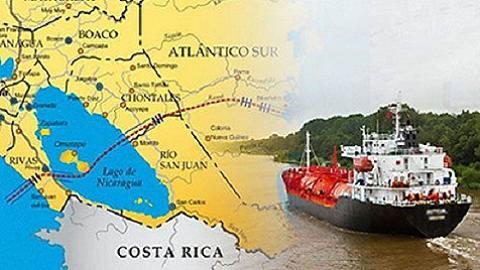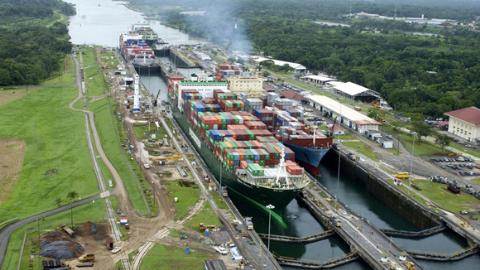Nicaraguan people strongly protest against the "Chinese Canal"
China's project of the century to dig a canal across Nicaragua, connecting the Pacific and Atlantic Oceans, has been strongly opposed by the people of this country.
Thousands of people, including farmers and indigenous activists, held a large protest in Nicaragua against China's construction of the Nicaragua Canal, which will connect the Pacific and Atlantic oceans, shortening ship journeys by tens of thousands of kilometers.
Activists in the country have staged protests over concerns that the construction will seriously pollute Central America's largest lake, while Nicaraguan farmers say the project will take away their farmland.
In the capital, Managua, protesters waved Nicaraguan flags and chanted: "Chinese out!", a reference to the eviction of the Hong Kong company that had won a preferential contract to build the canal, hoping to profit on Nicaraguan soil for 100 years.
According to a 25-year-old peasant protester, Darling Cruz, the project only “lined the pockets of the Chinese” and was detrimental to his country. On the roadside, some young extremists held up signs that read: “Ortega (referring to Nicaraguan President Daniel Ortega) is selling our homeland.”
On June 13, 2013, with 61 votes in favor and 28 votes against, the Nicaraguan National Assembly voted to approve the $40 billion trans-Nicaragua canal project, connecting the Atlantic and Pacific Oceans. This is a project considered historic in the country's economic development cooperation with foreign countries.
The Nicaraguan National Assembly has approved the transfer of the right to build and manage this entity to the Hong Kong Nicaragua Canal Development Investment Co., Ltd. (HK Nicaragua Canal Development Investment Co., Ltd. - HKND).
Regarding this project, President Ortega emphasized that this not only fulfills the wishes of many generations of Nicaraguan people but also helps the country attract foreign investment capital as well as promote economic development in the future, while "reducing the load" on the Panama Canal which is in a state of overload.
The Nicaraguan leader has full confidence in the feasibility and success of the new canal construction project, with a total investment of 40 billion USD, because the only canal connecting the two oceans located in Panama is currently often overloaded even though the government is implementing an expansion project.
 |
Nicaragua Canal to become Panama Canal competitor |
Nicaragua's Minister of Public Policy Paul Oquist said the canal project would increase the country's GDP by 15% in 2015, similar to the benefits the Panama Canal expansion project has brought to Panama. The canal's construction would create hundreds of thousands of jobs in Nicaragua.
The Nicaragua Canal is expected to be longer, wider and deeper than the Panama Canal, allowing larger ships to pass through.
Although the implementation of this project has certain economic benefits, it also entails the loss of hundreds of thousands of farmers in this country. Solving the problem of employment for farmers and overcoming environmental damage is a very difficult problem for this poor country.
Construction of the canal, which would connect the Atlantic and Pacific oceans, was originally scheduled to begin later this year. However, it has been reported that the start of construction of the shipping channel, which is considered a rival to the Panama Canal, will be postponed until 2015.
Russia's hand appears in Panama Canal project
On June 15, 2013, President Daniel Ortega and the head of HKND - Chinese businessman Wang Jin signed an agreement, officially granting an investment license to build the largest project in Latin America in the past 100 years. The Chinese company was given preferential treatment to build and manage the canal and related projects for a period of 50 years.
However, the contract also has open clauses that favor the Chinese company. The Nicaraguan government has granted HKND the right to extend the contract for another 50 years and to build two free trade zones, an oil pipeline, an airport and a railway along the canal.
On the Nicaraguan side, they will receive 1% of the profits in the first year of operation of the canal and the profit rate will increase by 10% every decade and will reach 100% after 100 years. Thus, after 100 years, Nicaragua will officially regain control of the canal.
This project will require a huge investment in land clearance work across the mainland part of Nicaragua along with a huge amount of excavation, because the canal has a record length of 200km, nearly 3 times longer than the Panama Canal (82km), its width and depth are also greater.
 |
The Panama Canal is currently being dredged and expanded to increase traffic volume. |
In October 2013, businessman Wang Jin pledged that the project would receive the largest investment of capital and human resources to complete on time. The first test on the canal will begin in December 2019 and it will open up a historic development opportunity not only for the people of this country but also for the whole of Latin America.
However, analysts also warned about the feasibility of the project when the new canal is located quite close to the Panama Canal, which was put into use in 1914. Along with the decline of the shipping industry, having two canal systems in one sea area will disperse traffic.
Panama, on the other hand, has not expressed any concerns about competition in the event of the Nicaragua Canal. Mr. Manuel Benitez, Deputy Director of the Panama Canal Authority, said on June 11, 2013 that even if the plan goes smoothly, Nicaragua will still need many years to complete the canal.
Furthermore, Panama is also about to complete a $5.2 billion plan to dredge and expand its canal, increasing the volume of goods traffic many times over, making the Panama Canal a serious competitor to the Nicaragua Canal in the future. It can be seen that the China-Nicaragua cooperation project has many potential risks.
However, it is certain that Beijing will find every way to implement this project because in addition to economic issues, it also brings unpredictable geopolitical benefits, especially in the context of Moscow's participation as an economic partner and political-military "protector".
Last June, the Voice of Russia radio announced the participation of Russian companies in the joint venture with China. In addition, Nicaragua signed a special agreement with Moscow, according to which Russian warships and aircraft will patrol Nicaragua's territorial waters and protect the canal from possible "provocations."
In addition, the Russian Navy Maintenance Station will be located on the territory of Nicaragua. This point has caused a lot of speculation in the Western media. They believe that on this occasion Russia will try to reach an agreement on the placement of its military bases in the region, in the plan to open a chain of bases in Seychelles, Cuba, Vietnam, Argentina and Nicaragua.
According to Dat Viet Newspaper






